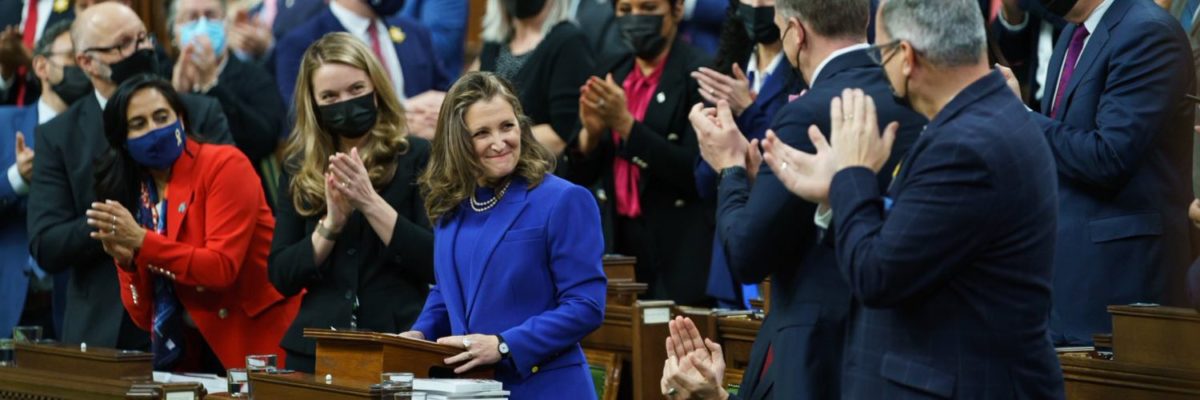Many Canadians were shocked by the profane verbal attack on Deputy Prime Minister Chrystia Freeland in Grande Prairie Friday by a thuggish convoy goon.
Social media immediately exploded with legitimate concern about the undeniable rising tide of attacks on women in politics and journalism in Canada by Q-adjacent protesters and their ilk. Cautionary reminders of the brutal assassination of Labour MP Jo Cox a week before the June 2016 Brexit vote in the U.K. were inevitable, and justified.
Politicians of all stripes – including Alberta Premier Jason Kenney – were quick to condemn the threatening outburst by a Grande Prairie man identified as Elliot McDavid, known for his association with far-right causes in the same northwest Alberta region where Freeland was born.
“The verbal harassment and threats directed at Minister @cafreeland during her visit to Alberta yesterday were reprehensible,” Kenney tweeted on Saturday. “If you disagree with a politician, by all means exercise your right to protest. But screaming threatening language & physical intimidation cross the line.”
No reasonable person would disagree with the sentiment expressed by Alberta’s premier in that tweet.
But when he followed up with another telling Freeland that “you’re always more than welcome to come and visit us here in the province where you grew up & your family lives,” that may have been more in response to ironic comparisons of McDavid’s offensive message and the premier’s fatuous advertising effort to woo tradespeople and young professionals from other provinces to friendly Alberta.
Regardless, not so welcome in Alberta are suggestions that the right-wing generally and the United Conservative Party (UCP) in particular have in fact encouraged just this kind of response to politicians, especially women, who advocate ideas they don’t like.
Yet it’s hard to credibly assert that this is not so, as Conservative politicians here are wont to do at times like this.
There are just too many examples, among them, the way former Progressive Conservative minister Sandra Jansen was run out of the PC leadership campaign by young thugs-in-short-pants associated with Kenney’s campaign in November 2016, and the chants of “lock ‘er up” directed at NDP Premier Rachel Notley as grinning former Harper government cabinet minister Chris Alexander waved his finger in time with the shouts a month later.
Indeed, a strong case can be made that Alison Redford, Progressive Conservative premier from October 2011 to March 2014, was driven out by her own caucus more for her Red Tory reputation and gender than for the comparatively minor scandals that bedevilled her premiership.
One of the most striking examples of respectable mainstream conservatives engaging in activities that, intentionally or not, encouraged extremists to attack women who opposed their policies was the display of a poster identifying environmentalist Tzeporah Berman as an “enemy of the oilsands” at a government news conference in June 2019, soon after the election of the UCP government.
Berman had served for a spell in 2016 – at the request of some major oilsands companies, in fact – as co-chair of the Notley Government’s Oil Sands Advisory Group, charged with making recommendations on the NDP’s Climate Leadership Plan. The UCP demonized her, quickly turning her role into an effective attack on Notley’s NDP Government.
So where was Premier Kenney when Oil Sands Strong founder Robbie Picard held up the apparently uncontroversial poster attacking Berman at the news conference about the UCP Government’s then new Energy War Room and its assignment to “fight lies and defamation” about the oilsands?
Why, he was on stage with Picard!
Indeed, Picard was introducing the newly elected premier, singing his praises, as then Canadian Association of Petroleum Producers president Tim McMillan, controversial blogger and researcher Vivian Krause, and Energy Minister Sonya Savage, among others, looked on.
I can’t recall any tweets by Kenney or any of the Conservative allies on the stage with him condemning Picard for waving a poster that clearly, in the context of what Kenney had advocated in the 2019 election campaign, equated “enemy of the oilsands” with “enemy of Alberta.”’
As alert readers will recall, the public inquiry (which never met in public) that was the UCP’s policy bookend to the War Room was formally known as the “Inquiry into Anti-Alberta Energy Campaigns.” (Emphasis added.)
Berman reported dozens of violent and sexist social media messages and threatening voicemails soon after the UCP news conference. She was spat upon and physically threatened at Edmonton International Airport.
And when she was invited to speak to the Alberta Teachers Association in 2018, more furious, personal UCP denunciations followed, aided and abetted by Alberta media.
In a statement, now deleted from its website, the UCP falsely called her an “anti-Alberta activist,” and a chorus of friendly columnists contributed a supportive echo chamber. “The enemies of Alberta’s energy industry are running the province,” said one headline. Another described her as “Berman the pipeline-hater.”
The same “rage farming” techniques continue to be used now by more than one of the candidates vying to replace Kenney, most notably frontrunner Danielle Smith, and by federal Conservative leadership candidate Pierre Poilievre, University of Alberta political scientist Jarod Wesley told The Tyee Saturday.
So when you hear those pious denunciations of McDavid’s crude tirade at Canada’s deputy PM, you might ask the Alberta Conservatives joining in where they were when similar attacks were being launched against other prominent women.
For her part, Freeland diplomatically tried to put an end to the matter Saturday night, tweeting that “the Alberta I know is filled with kind and welcoming people” and “one unpleasant incident yesterday doesn’t change that.”
That was nice of her, but it doesn’t mean the problem’s gone away.




